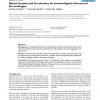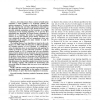4679 search results - page 891 / 936 » Modeling When Connections Are the Problem |
151
click to vote
GECCO
2010
Springer
15 years 1 months ago
2010
Springer
This paper takes an economic approach to derive an evolutionary learning model based entirely on the endogenous employment of genetic operators in the service of self-interested a...
111
click to vote
AROBOTS
2008
15 years 1 months ago
2008
Online trajectory generation for robots with multiple degrees of freedom is still a difficult and unsolved problem, in particular for non-steady state locomotion, that is, when th...
119
Voted
BMCBI
2007
15 years 1 months ago
2007
Background: An adequate and expressive ontological representation of biological organisms and their parts requires formal reasoning mechanisms for their relations of physical aggr...
104
click to vote
BMCBI
2008
15 years 1 months ago
2008
Background: The reconstruction of genetic regulatory networks from microarray gene expression data has been a challenging task in bioinformatics. Various approaches to this proble...
110
click to vote
CORR
2010
Springer
15 years 1 months ago
2010
Springer
Given data drawn from a mixture of multivariate Gaussians, a basic problem is to accurately estimate the mixture parameters. We give an algorithm for this problem that has running ...


